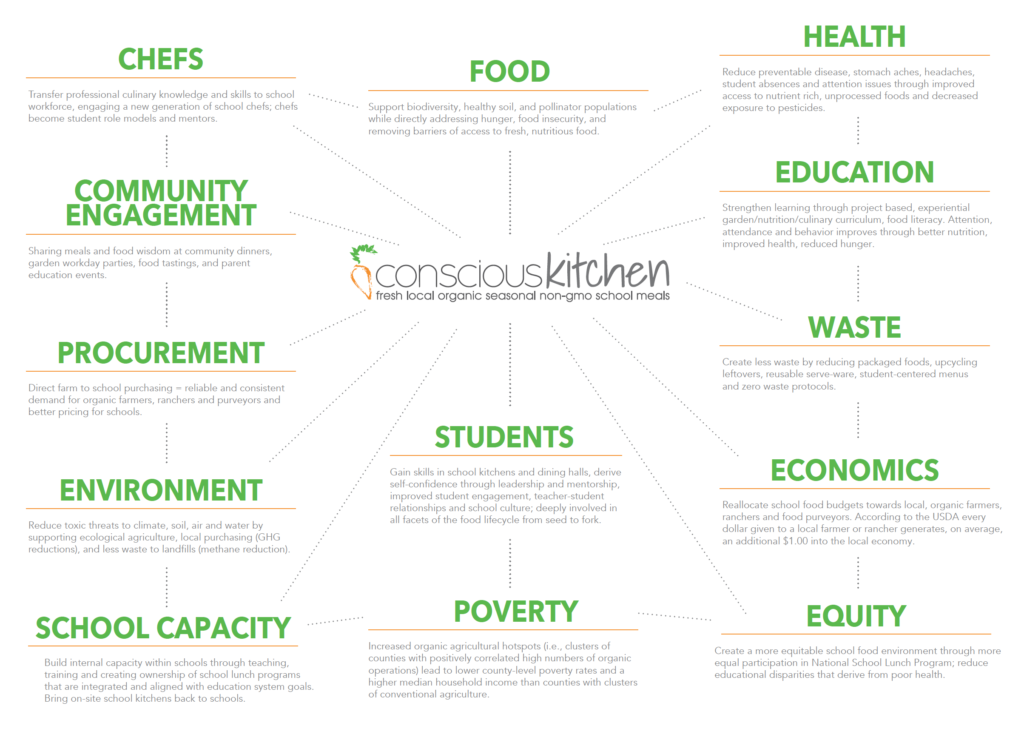The Conscious Kitchen commitment to fresh, local, organic, seasonal food protects our air, soil and water, strengthens our regional food supply and economy, supports the health and learning readiness of our future leaders, and collaboratively engages our community to break the cycle of prepackaged, unhealthy school food.
We create deep roots in local communities.
We bring students, farmers, ranchers, mission-driven food providers, school district leaders, school food service workers, health officers, health and education professionals, chefs and restaurants, waste management officials, elected officials, parents and teachers together with a common goal of improving the health and well-being of our children, by transforming the school dining experience . This ensures that Conscious Kitchen is created by, and representative of, the community it serves.
Conscious Kitchen’s programs are place based models and demonstration sites designed to build school capacity and catalyze a movement towards shifting state policy in California and beyond. Conscious Kitchen’s objective is use the proof of concept and data to motivate and incentivize educators and other stakeholders to revalue — and invest in — food and nutrition as a foundational aspect of the education system.
We create collective impact.
Conscious Kitchen builds cross sector collaborations to address global and societal challenges community by community through food, with the well-being of children at the core.
The impact is vast. Civil Eats calls the farm to institution sourcing model the “sleeping giant” of local food. According to the USDA, nearly 100,000 schools/institutions serve school lunches to 30.4 million students each day. 4.9 billion lunches are served annually. With multimillion dollar food procurement budgets, shifts in school food buying have the potential for major impacts on local economies, agricultural systems, food access, public health and better life outcomes for the next generation.
Examples of sectors we impact:
Conscious Kitchen supports ecological agriculture and small-scale farming and ranching operations by creating dependable local demand and farm-to-table networks for farmers and ranchers.
School behavior and focus issues are often associated with nutritional deficits or food insecurity. Teachers and administration have reported a reduction in behavioral issues, increased attention spans and an increase in students taking leadership roles since the arrival of CK into their schools. 72% of teachers noticed positive changes in student behavior and/or ability to stay on task after lunch during the CK demonstration week in West Contra Costa Unified School District.
Public health: Eating highly processed foods, consuming sugary drinks and a diet deficient in elements necessary for proper development are contributing to an epidemic of obesity and associated health problems among children in the US. With the support of University of California San Francisco’s Family Health Outcomes Project (FHOP), County Health and Human Services and other community members, CK is working closely with its partner schools to analyze data to assess the impact that the transition to healthy, fresh food served in schools has on both minds and bodies.
“Kids were significantly more likely to eat fruits and vegetables when Conscious Kitchen was serving school lunch than with the regular school lunch. Eating fruits and vegetables can make a big difference in how well students do in school, and the test scores they get.” —Jennifer Rienks, Associate Director of the UCSF Family Health Outcomes Project
Food waste: Reducing food losses by just 15% translates to enough food to feed more than 25 million Americans every year. During the 2018–2019 school year, Conscious Kitchen served more than 1,220 chef prepared low-waste FLOSN meals per day, designed with student input. This translates to as much as 62% less food and packaging waste. Prior to CK, students had been throwing significant amounts of pre-packaged heat and serve food served in traditional school lunch programs into the garbage, contributing to our already overfilled landfills.
Local economies: According to the USDA Farm to School Census, every dollar given to a local farmer or rancher generates, on average, an additional $1.00 of local economic activity. By forging partnerships with local farmers, ranchers, chefs, purveyors, and grocers, the program supports local businesses, and in turn, catalyzes a network of local ethical businesses dedicated to supporting local school food programs.
Equity: Prior to the Conscious Kitchen program at Willow Creek Academy, 120 students qualifying for government subsidized free & reduced meal (FRM) programs were eating school lunches. Within the first week of the CK program in 2015-2016, 280 students (FRM + paid students) were eating, creating a more equitable school food environment. That number has increased throughout ensuing years.
Poverty: Increased organic agriculture reduces poverty and increases household incomes. Research shows that organic agricultural hotspots (i.e., clusters of counties with positively correlated high numbers of organic operations) lead to lower county-level poverty rates and a higher median household income. “Our results show that organic hotspot membership leads to a lower county-level poverty rate and a higher median household income. A similar result is not found when investigating the impact of general [i.e., conventional] agricultural hotspots.”
Climate: In addition to reducing food miles traveled through local purchasing, shifting school food purchasing towards organic farming will help mitigate climate change through improved land management, less reliance on fossil fuel-based inputs, and healthier soil. Research finds that organic farms capture more carbon—a greenhouse gas that contributes to climate change—from the air than soil from conventional farms, and store it long term. Shifting school purchasing towards more plant-based menus is also an important climate mitigation strategy. CK’s menus feature two plant-based meals a week, and all meat in CK’s menus is pastured and organic.
Strengthening local food systems and providing nutritious food to our children is our call to action. Conscious Kitchen creates the intention and a structure that translates these ideas into action.
